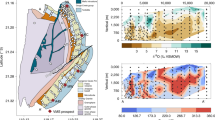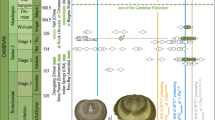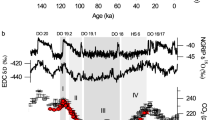Abstract
The marine isotopic stage 11 (MIS 11) is an extraordinarily long interglacial period in the Earth's history that occurred some 400,000 years ago and lasted for about 30,000 years. During this period there were weak, astronomically induced changes in the distribution of solar energy reaching the Earth. The conditions of this orbital climate forcing are similar to those of today's interglacial period1,2, and they rendered the climate susceptible to other forcing — for example, to changes in the level of atmospheric carbon dioxide. Here we use ice-core data from the Antarctic Vostok core to reconstruct a complete atmospheric carbon dioxide record for MIS 11. The record indicates that values for carbon dioxide throughout the interglacial period were close to the Earth's pre-industrial levels and that both solar energy and carbon dioxide may have helped to make MIS 11 exceptionally long. Anomalies in the oceanic carbonate system recorded in marine sediments at the time3, for example while coral reefs were forming, apparently left no signature on atmospheric carbon dioxide concentrations.
This is a preview of subscription content, access via your institution
Access options
Subscribe to this journal
Receive 51 print issues and online access
$199.00 per year
only $3.90 per issue
Buy this article
- Purchase on Springer Link
- Instant access to full article PDF
Prices may be subject to local taxes which are calculated during checkout

Similar content being viewed by others
References
Berger, A. & Loutre, M. F. in Earth's Climate and Orbital Eccentricity: The Marine Isotope Stage 11 Question (eds Droxler, A. W., Poore, R. Z. & Burckle, L. H.) 17–26 (Am. Geophys. Union, Washington DC, 2003).
Berger, A., Loutre, M. F. & Crucifix, M. Surv. Geophys. 24, 117–138 (2003).
Droxler, A. W., Poore, R. Z. & Burckle, L. H. (eds) Earth's Climate and Orbital Eccentricity: The Marine Isotope Stage 11 Question (Am. Geophys. Union, Washington DC, 2003).
EPICA community members Nature 429, 623–628 (2004).
Petit, J. R. et al. Nature 399, 429–436 (1999).
Raynaud, D. et al. in Earth's Climate and Orbital Eccentricity: The Marine Isotope Stage 11 Question (eds Droxler, A. W., Poore, R. Z. & Burckle, L. H.) 27–40 (Am. Geophys. Union, Washington DC, 2003).
Cunningam, J. & Waddington, E. D. J. Glaciol. 36, 269–272 (1990).
Ramsay, J. G. Folding and Fracturing of Rocks (McGraw-Hill, New York, 1967).
Pépin, L., Raynaud, D., Barnola, J. -M. & Loutre, M. F. J. Geophys. Res. 106, 31885–31892 (2001).
Ruddiman, W. F. Clim. Change 61, 261–293 (2003).
Cuffey, K. M. & Vimeux, F. Nature 412, 523–527 (2002).
Goujon, C., Barnola, J. -M. & Ritz, C. J. Geophys. Res. 108, doi:10.1029/2002JD003319 (2003).
Author information
Authors and Affiliations
Corresponding author
Ethics declarations
Competing interests
The authors declare no competing financial interests.
Rights and permissions
About this article
Cite this article
Raynaud, D., Barnola, JM., Souchez, R. et al. The record for marine isotopic stage 11. Nature 436, 39–40 (2005). https://doi.org/10.1038/43639b
Published:
Issue Date:
DOI: https://doi.org/10.1038/43639b
This article is cited by
-
Early Middle Palaeolithic culture in India around 385–172 ka reframes Out of Africa models
Nature (2018)
-
Unraveling the forcings controlling the vegetation and climate of the best orbital analogues for the present interglacial in SW Europe
Climate Dynamics (2018)
-
Glacier advance during Marine Isotope Stage 11 in the McMurdo Dry Valleys of Antarctica
Scientific Reports (2017)
-
Species accumulation over space and time in European Plio-Holocene mammals
Evolutionary Ecology (2011)
-
High-resolution carbon dioxide concentration record 650,000–800,000 years before present
Nature (2008)
Comments
By submitting a comment you agree to abide by our Terms and Community Guidelines. If you find something abusive or that does not comply with our terms or guidelines please flag it as inappropriate.



